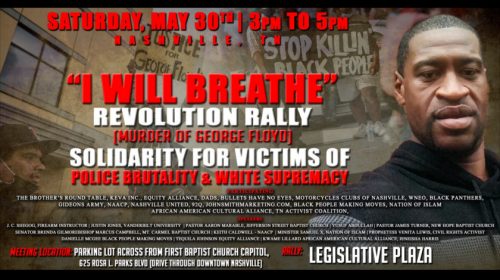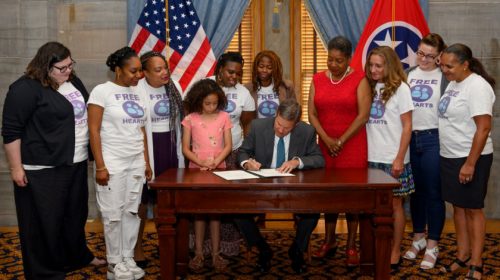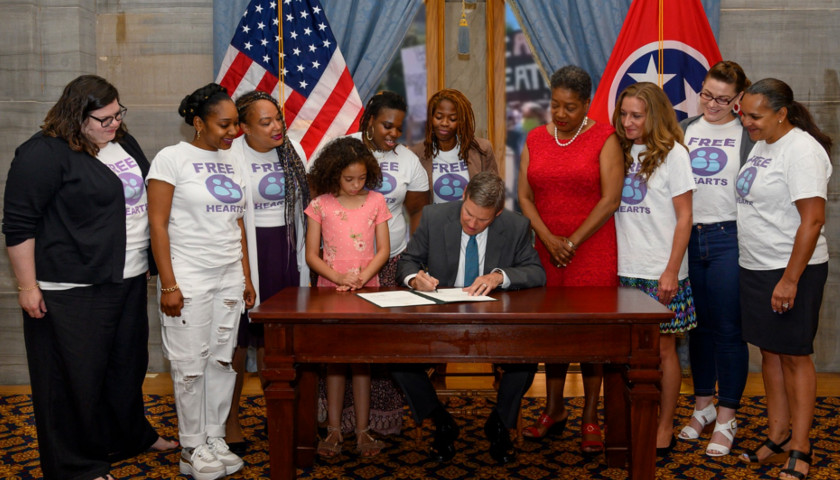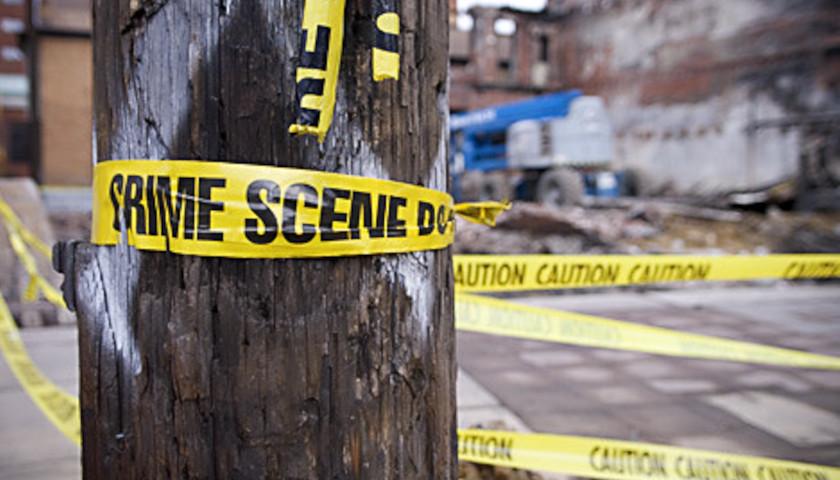There have been a number and variety of both high-profile and lesser-publicized events in Nashville that at first glance are seemingly unrelated – but are actually connected by way of the groups that have been involved with them.
The first and most notable event took place on Saturday, May 30, when the Music City’s protests over the death of George Floyd on May 25 turned into a violent riot.
The statue of a former state legislator was toppled at the Capitol, police cars smashed, Nashville’s historic city hall was vandalized with broken windows, spray paint and set on fire, dozens of businesses on Broadway were vandalized and explicit graffiti covered surfaces along the rioters’ path on downtown streets.
All of this stands in stark contrast to the COVID-related shutdown over the past two months of the entertainment and hospitality businesses Nashville is so well known for.

While the weekend protest was promoted as a “I Will Breathe” rally – inspired by Floyd’s final words – one member of the Tennessee Highway Patrol said days prior to the event that it was referred to as a stop police brutality and white supremacy protest.
The second event was just a few days later, when the Metro Nashville Council met on June 2 to discuss Mayor John Cooper’s budget for fiscal year 2021. A new budget must go into effect on July 1, and if no other version gets passed, Nashville will automatically get Mayor Cooper’s version with a 32 percent property tax increase.
While a public hearing on the budget was scheduled, in-person attendance at the meeting was “discouraged in order to protect the public health, safety and welfare,” according to the meeting agenda.
A phone number was provided for the purpose of live input when the agenda item was called up during the course of the meeting.
The public hearing portion of the marathon 11-hour Council meeting was dominated with more than a hundred nearly identical calls on the phone and in person for Nashville’s police department – more broadly referred to as “public safety” – to be defunded and the funds to instead be allocated to “public goods” or “social goods.”
While it may have seemed organic and spontaneous, the promotion and coordination of the efforts came by way of eight groups involved in The Nashville People’s Budget Coalition.
The Coalition has prepared a professionally-appearing 35-page budget document dated May 26, just one day after Floyd’s death, that essentially calls for defunding Nashville police.
In its budget document, the Coalition says it is “building a Nashville where public safety includes communities with fully funded education, access to housing and health care, and freedom from policing and jails.”
Some of the Coalition’s points – “too often, budgets reflect the priorities of elected officials and power brokers who make decisions behind closed doors and pursue the interests of a few at the expense of our communities,” could be agreed to by far-ranging political extremes and everyone in between.
The Coalition’s main point of contention is “public safety” expenditures, the vast majority of which – $362.5 million of Mayor Cooper’s 2021 budget – goes towards Nashville’s “criminal legal system” including the Metro Nashville Police Department (MNPD), Sheriff, jails, courts and the district attorney.
As specific examples of misguided criminal legal system capital spending, the Coalition points to $12 million for two MNPD helicopters, $1.6 million for the MNPD Mounted Patrol barn and $17.2 million on the new Sheriff’s headquarters.
The funding Mayor Cooper proposes for the operation of the criminal legal system is more than that for all of health care, social services, affordable housing, transit, infrastructure, libraries, parks, community centers and rental and tax relief services combined – what the Coalition refers to as public or social goods.
This is where there is likely to be less bipartisan agreement on which activities and associated funding are within government’s purview, especially in light of the protest-turned-riot just a few days prior to the Council meeting discussion.
De-funding police departments has now become a growing national mantra that includes leaders from America’s two largest cities with Los Angeles Mayor Eric Garcetti announcing reductions in the LAPD budget increases and New York city council members calling for significant reductions in NYPD’s $6 billion budget.
Interestingly, just a few weeks prior, some of the country’s state and local leaders were using law enforcement to enforce COVID-19 related stay-at-home executive orders against those who went to church or to protest the violation of their constitutionally-protected rights.
In a meeting of the Tennessee House State Committee last week, a bill advanced that says that the governor or chief executive officer of a local government shall not require a law enforcement agency or an officer to enforce executive orders that close a private business, restrict the freedom to assemble peaceably or restrict the freedom to travel.
At least one Democrat member of the Committee, who happens to be part of the Nashville delegation, asked who would enforce the executive orders if law enforcement could not do it.

In a matter of weeks, in many of the locales with the strictest stay-at-home orders enforced by law enforcement, close-contact riots have taken place over consecutive days and there are calls to defund the police.
If the wide-ranging expectations of police departments have increased, so too has their militarization through tactical vehicles, aircraft, weapons, surveillance equipment, and night-vision equipment, among others, which had its start in the National Defense Authorization Act of 1997 Section 1033 Surplus Program which allowed the transfer of excess Department of Defense equipment to state and local law enforcement agencies.
While initially a windfall to law enforcement agencies, the issue of upkeep and obtaining replacements when the handed-down DoD equipment is beyond its useful life undoubtedly results in higher future operational and capital expenditures.
Military-style vehicles and personal equipment also presents quite a different image from that of the approachable neighborhood patrolman of the past and, as the Coalition says, “that many experience more as a threat than a means of protection.”
While not calling for a reduction in Mayor Cooper’s proposed 32 percent property tax increase or cutting spending, the Coalition says that “without also implementing a massive and well-funded tax relief program [it] will impose a significant burden on predominantly Black and low-income communities already burdened by decades of divestment from public goods.”
A series of points along these lines were prepared and by member groups of the Coalition, which include Black Lives Matter Nashville, Free Hearts, Gideon’s Army, Music City Riders United (MCRU), No Exceptions Prison Collective, People’s Alliance for Transit, Housing & Equity (PATHE), Southerners on New Ground Nashville (SONG Nashville) and Workers’ Dignity / Dignidad Obrera.
The talking points were recited repeatedly and almost verbatim by speakers at the Council meeting, according to Metro Council member-at-large Steve Glover, despite requests to the contrary by the Council.
Meanwhile, those who oppose Mayor Cooper’s 32 percent property tax increase were unable to get through on the call-in number despite repeated calls over a period of several hours.
The third incident that went more or less unpublicized was a very disturbing protest that took place outside the Governor’s mansion on May 21.
While that protest took place prior to the other two events, it was the Nashville People’s Budget Coalition that revealed the names of some of the groups that took part in the earlier, gruesome protest.
The protesters, shutting down the street in front of the executive residence, lined the wrought-iron fence with mock body bags, coffins and tombstones in a twisted display meant to represent lives lost in the state’s prisons due to the coronavirus.
As the groups demanded the mass release of prisoners, they hung banners on the fencing that read “Killer Bill Lives Here.”
Coalition Member Groups
The Nashville People’s Budget Coalition lists eight member groups that, through their websites or Facebook pages, describe their organizations, missions and some of their recent activities.
Black Lives Matter Network is a chapter-based national organization working for the validity of Black liberation movement of which Black Lives Matter Nashville is a local chapter with the guiding principles of diversity; restorative justice; globalism; queer affirming; unapologetically black; collective value; empathy; loving engagement; transgender affirming; black villages; black women; black families; intergenerational.
A major participant in the protest-turned-riot, Black Lives Matter Nashville’s Facebook page shared the May 30 event which was called “I Will Breathe” Revolution Rally (Murder of George Floyd) Solidarity for Victims of Police Brutality & White Supremacy. Listed as participating is The Brother’s Round Table, KEVA Inc., Equity Alliance, DADS, Bullets Have No Eyes, Motorcycles Clubs of Nashville, WNEO, Black Panthers, Gideon’s Army, NAACP, Nashville United, 92Q, JohnSmithMarketing.com, Black People Making Moves, Nation of Islam, African American Cultural Alliance and TN Activist Coalition.
Free Hearts is an organization led by formerly incarcerated women that provides support, education, and advocacy to families impacted by incarceration, with the ultimate goals of reuniting families and keeping families together.
Free Hearts’ Facebook page included a post, “Here is what you can say about the Mayor’s proposed budget.”
The day after the Council meeting, there was a follow-up post, “Last night was inspiring, but the work doesn’t end here. It’s only just beginning. Our coalition knows that police and jails ultimately do not keep us safe. Together #wekeepussafe. We are readying next steps as we push to demand a budget that meets the needs of black and indigenous folks, people of color, and working class folks in Nashville by divesting from policing and investing in the communities we deserve to live and thrive in. Stay tuned for critical next action steps in the days to come as we prepare for Council’s final vote on June 16! #defundpolice #defendblacklives #wekeepussafe”
In an earlier post from May 21, Free Hearts referred to the Governor as #KillerBill and included a video of the protest at the executive residence along with the post, “A call to action demanding Gov. Bill Lee to use his Clemency powers and to change policies that are killing our people, our family, our friends, our loved ones everyday that they are incarcerated. Sick, elderly, disabled, parole/probation—let them go! #ClemencyNow #FreeThemAll”
Gideon’s Army’s mission is to “act collectively, boldly and strategically as a unified force for all children. We eliminate the root causes of the prison pipeline, save our children from death and incarceration and guide them on a secure path to success.”
A video on the organization’s Facebook page said that they were not part of the May 30 protest-turned riot cautioned against agitators, spoke passionately against those tactics and promoted more strategic approaches.
Regarding the Metro Council meeting, the organization reported on Facebook, “over nearly 11 hours, more than 125 called in or showed up in person to tell Metro Council what you want to see in a true “public safety” budget: fully funded education, affordable housing, transit, social services, libraries, community centers, and all the things that keep us safe in ways that policy & jails never will.”
Music City Riders United (MCRU) is an organization of public bus riders fighting for equitable transit to meet the needs of working-class Nashvillians. MCRU continues to address racial and economic inequities in Nashville both in transit and more widely as a project of Workers’ Dignity, an umbrella organization of low-wage workers organizing for economic justice and the dignity of all.
MCRU prepared a Bus Route Report Card and determined that Nashville’s WeGo public transit system is not adequately serving the city’s workforce and ridership, and Metro Nashville Public Works and the Tennessee Department of Transportation are failing riders in providing pedestrian safety near bus stops, according to 619 bus riders on 316 different routes reported through surveys of 10 standards of quality conducted between May and October 2018.
MCRU posted to Facebook a step-by-step guide for calling in to provide public comment at the Metro Council meeting on the budget. “This year our fight is even stronger because we’re part of the movement to build a People’s Budget with the Nashville People’s Budget Coalition.”
No Exceptions Prison Collective is a grassroots initiative in Nashville dedicated to transforming the social segregation of prison by advocating that there be no exceptions to the abolition of slavery. The organization maintains that abolition of slavery or involuntary servitude in the Thirteenth Amendment to the U.S. Constitution, which excepted punishment for a crime, created a carve out for slavery’s continued existence that is embodied through mass incarceration via the prison industrial complex.
In addition to being a contributor to the Coalition budget, according to a Facebook post, director Jeannie Alexander was at the peaceful downtown Nashville protest on June 4 and on May 21 “joined fellow Tennessee Organizing for Power Statewide Coalition members today in an action highlighting the rising death toll from Governor Bill Lee’s policies which cost the lives of Tennesseans.”
“We shut down the street in front of the Governor’s plantation today with a display of these deaths. We lined his fence with bodybags, coffins, and tombstones to represent the precious lives lost to his cruelty.”
People’s Alliance for Transit, Housing and Employment (PATHE), which stands for the ordinary people of Nashville and against the greedy, “is a coalition of ordinary people – renters, unhoused people, transit employees, construction workers, bus riders, students, activists and other concerned residents – that came together because we were tired of city leaders working only for the interests of developers, big corporations, and the rich.”
“Instead, we’ve demanded the city powers that be take necessary steps to address Nashville’s crises in housing, transportation, and employment.”
PATHE is a movement for 31,000 affordable homes, the lack of which is “a crisis that is hurting thousands of Nashville residents with one of the largest divisions of haves and have-nots in our lifetime.”
PATHE believes that the housing crisis is urgent with skyrocketing rent causing displacement while the rich and powerful continue to profit from it and calls for solutions that treat dignified, affordable housing as a basic human right.
Southerners on New Ground (SONG) Nashville is “a regional Queer Liberation organization made up of people of color, immigrants, undocumented people, people with disabilities, working class and rural and small town, LGBTQ people in the South. SONG’s mission is a home for LGBTQ liberation across all lines of race, class, abilities, age, culture, gender, and sexuality in the South. We build, sustain, and connect a southern regional base of LBGTQ people in order to transform the region through strategic projects and campaigns developed in response to the current conditions in our communities. SONG builds this movement through leadership development, intersectional analysis, and organizing.”
SONG shared a Facebook post by Tennessee Organizing for Power Statewide about the May 21 protest at the Governor’s mansion to demand mass release from Tennessee prisons that included a photo montage from the protest.
Workers’ Dignity / Dignidad Obrera is a worker center organizing for economic justice and dignity, especially low-wage workers facing abuse by employers, bus riders confronting transit racism, and immigrants facing increased ICE raids and detention. The organization has monthly training meetings for “members” who need help in recovering unpaid wages, as explained a YouTube video in Spanish with English subtitles.
Workers’ Dignity is fighting for a fully-funded equitable public transit system with MCRU and housing for all including 31,000 affordable homes through PATHE.
The organization had a live video from the May 30 protest on its Facebook page as well numerous posts about the Coalition’s budget proposal, including talking points to be used during the Metro Council meeting.
Most if not all of the organizations appear to be linked to Tennessee Organizing for Power Statewide (TOPS), a coalition of over 40 justice-oriented and grassroots groups located across the state.
Established in February 2019, the coalition envisions new possibilities for public safety that are rooted in fully resourced communities, according to the “About” section of the TOPS Facebook page.
TOPS is noticeably more forward in asking on its Facebook page for donations directly or on behalf of the Nashville People’s Budget Coalition, the individual groups that make up the Coalition, or the Nashville Economic Justice Alliance, Health and Free Tennessee, The Equity Alliance Fund and The Equity Alliance.
The TOPS website reveals an extensive list of demands “surrounding the ongoing issues Tennesseans are facing that re now exacerbated by COVID-19.”
The demands are broken into several wide-ranging categories including jails, detention centers and Tennessee Department of Corrections, prison release, housing, workers’ rights, economic justice, healthcare, voting rights, as well as education and children.
According to its Facebook page, TOPS was live during the May 21 protest at the Governor’s mansion, posting “Families and organizers from across TN, are demanding that Gov. Lee grant our people #ClemencyNow #FreeThem All”
—
Laura Baigert is a senior reporter at The Tennessee Star.






The democrats have maintained their plantation well over the years. What these groups want is to have no responsibility for their actions. They thrive on emotions, can’t process facts and don’t understand the law of cause and effect. They believe that they will find dignity and respect, purpose and meaning in their lives if their demands are met.
Meanwhile, Nashville continues its descent, swirling rapidly down the drain into the sewer of socialism.
Idiots does not properly describe these groups. Someone tell them if they want to see the real root of the problems to go home and look in the mirror. True card carrying idiots.
Who are you kidding? There aren’t really eight separate groups. Realistically, how does a “group” of people who are riding the city busses, living under overpasses or trying to decide which bathroom to use have the time, the money or the overall wherewithal to coordinate these kinds of effort? Heck even with the entire organization like Metro government and all the money that we throw at the Nashville schools, our kids still can’t read!
This is all the effort of the American political “left” and their propaganda arm, the Mainstream Media. Throw in some bad foreign actors who hate or want to take down America, like CAIR, the CCP, Soros, and you wind up with a very dangerous situation!